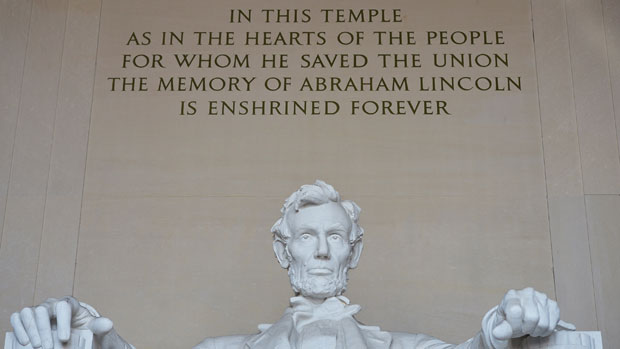Abraham Lincoln's contested legacy: emancipator or tyrant?
As the US prepares to mark the 150th anniversary of the president's assassination, historians still don't agree

A free daily email with the biggest news stories of the day – and the best features from TheWeek.com
You are now subscribed
Your newsletter sign-up was successful
Events are being held today across the United States to mark the 150th anniversary of the assassination of President Abraham Lincoln. Although considered one of the country's greatest leaders, some continue to contest the legacy he left behind. "Despite lingering discomfort with some of his actions – particularly around the issue of civil liberties – history has largely vindicated him," says The New York Times.
His life
Born in 1809 to two illiterate farmers in a one-room log cabin in rural Kentucky, Abraham Lincoln had a humble start to life. His family was blighted by illness, death and poverty, and he received little formal education as a child. Despite this, he went on to study law and officially entered the political arena in 1834 when he won a seat in the Illinois General Assembly as a member of the new Whig party. Twelve years later, Lincoln was elected to the US House of Representatives, and he went on to become the 16th president of the United States in 1860.
The Week
Escape your echo chamber. Get the facts behind the news, plus analysis from multiple perspectives.

Sign up for The Week's Free Newsletters
From our morning news briefing to a weekly Good News Newsletter, get the best of The Week delivered directly to your inbox.
From our morning news briefing to a weekly Good News Newsletter, get the best of The Week delivered directly to your inbox.
His death
On April 14 1865, Lincoln was shot in the back of the head by actor and Confederate sympathiser John Wilkes Booth, who had snuck into the president's box at Ford's Theatre in Washington. Lincoln never regained consciousness and died early the following morning.
It was the first time an American president had been assassinated, and the country descended into shock and mourning. "No loss has ever been comparable to this," Parke Godwin, editor of the Evening Post, wrote at the time. "Never in human history has there been so universal, so spontaneous, so profound an expression of a nation's bereavement."
His legacy
A free daily email with the biggest news stories of the day – and the best features from TheWeek.com
"Lincoln's canonisation began almost immediately. Within days of his death, his life was being compared to Jesus Christ," say researchers at the University of Virginia's Miller Center.
Though heralded as one of the greatest Americans of all time, his legacy has been contested as different groups interpret his actions. "Northerners and Southerners, blacks and whites, East Coast elites and prairie Westerners, liberals and conservatives, the religious and secular, scholars and popularisers – all have recalled a sometimes startlingly different Lincoln," argues Philip Kunhardt in Smithsonian Magazine.
Leading the Union to victory in America's civil war, Lincoln was hailed as shrewd military strategist, a savvy leader and the saviour of the Union. In 1863, he gave one of the most influential speeches ever delivered in American history; in just ten lines, he emphasised the need for equal justice and democracy in his Gettysburg address.
That same year, he issued the Emancipation Proclamation which freed all slaves in the southern states and paved the way for slavery's eventual abolition. A hundred years later, Martin Luther King Jr called the speech "a beacon of hope to millions of Negro slaves who had been scarred in the flame of withering injustice”.
But by his own admission, Lincoln never set out to end slavery. In a letter to the editor of the New York Tribune about his war aims, Lincoln wrote: "My paramount object in this struggle is to save the Union, and is not either to save or to destroy slavery. If I could save the Union without freeing any slave I would do it, and if I could save it by freeing all the slaves I would do it; and if I could save it by freeing some and leaving others alone I would also do that."
The African-American writer Frederick Douglass, who lobbied Lincoln tirelessly while campaigning for abolition, acknowledged that Lincoln was "a progressive man, an honourable man, and at heart an antislavery man". But he also argued that he was "pre-eminently the white man's president" and American blacks "at best only his step-children”.
Lincoln was also criticised for suspending habeas corpus – one of "the most hallowed" concepts in Anglo-American law – which led to thousands of suspected war traitors and protesters being imprisoned without trial. This was for many historians "a serious blemish on Lincoln's record", says the New York Times. His opponents labelled him a "tyrant" for expanding his presidential powers, but Lincoln always maintained that the rebellion justified his actions.
Regardless of Lincoln's controversies, the eradication of serfdom and slavery was an "extraordinary" achievement, argues author and historian Daniel Hannan in The Daily Telegraph. "That, in my book, makes the shambling, decent, canny, unstuffy Lincoln a hero of the English-speaking peoples."
-
 House votes to end Trump’s Canada tariffs
House votes to end Trump’s Canada tariffsSpeed Read Six Republicans joined with Democrats to repeal the president’s tariffs
-
 Bondi, Democrats clash over Epstein in hearing
Bondi, Democrats clash over Epstein in hearingSpeed Read Attorney General Pam Bondi ignored survivors of convicted sex offender Jeffrey Epstein and demanded that Democrats apologize to Trump
-
 Are Big Tech firms the new tobacco companies?
Are Big Tech firms the new tobacco companies?Today’s Big Question Trial will determine if Meta, YouTube designed addictive products